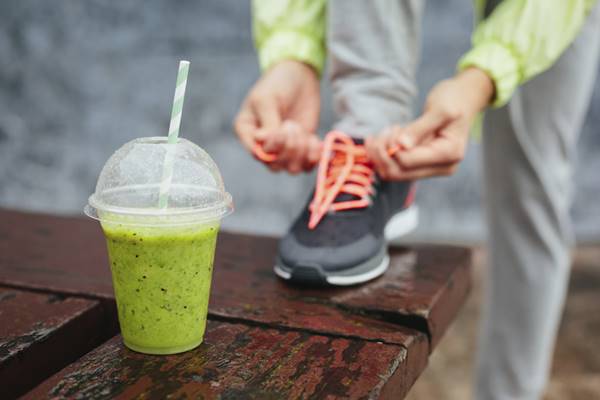
If you’re new to running, it’s vital to prep your body correctly before heading out the door. And in the long term, warming up right will also help ensure your success as a runner. But how do you get your body primed properly? In my experience as a coach and as a runner, here are the top five things to avoid doing before your workout.
WARMUP MISTAKE #1: STATIC STRETCHING
Most of us learned how to warm up many years ago in elementary or middle school PE classes. Much of that is now out-of-date. Today, recent research indicates that static stretching is not the best for a runner. In fact, one recent study found that static stretching before a run leads to slower starts and a greater perceived effort. Other studies show that even the simple sit-and-reach stretch can decrease your ability to stride naturally.

Instead, a dynamic warmup appears to prepare your muscles more effectively.
Static stretching for 30 to 60 seconds lengthens the muscle, but in doing so it also appears to affect the signals between the muscle and the brain, triggering a protective reflex that prevents the muscle from being overstretched. Therefore, muscles become inhibited and are not able to contract as forcefully. This reflex decreases the strength and power of the muscle for a short time afterward.
A dynamic warmup refers to moving your muscles through a wide range of motion that simulates the running movement. Think of it as lubricating your joints before a run. Start with these 5 warmup moves that can be done before every run.
WARMUP MISTAKE #2: EATING TOO MUCH
This should seem obvious, but it needs repeating: Avoid eating a big meal too close to your run. We have all heard about the importance of carbo loading for runners, but a big platter of spaghetti and meatballs—even though it’s loaded with many necessary nutrients—is not going to feel so good sitting in your stomach.

It’s important to time your nutrition for best results. The digestive process slows down while we run and is unable to operate as usual because the normal blood flow to our gastro-intestinal (GI) system is diverted during exercise. (The diverted blood flow is redirected toward working muscles.) Therefore, if we eat a meal, especially a large one, food is not able to be digested normally, likely causing some sort of GI distress like cramping, side stitches, or worse.
If you are running first thing in the morning—for shorter runs—you may not even need to eat at all. Running on an empty stomach for runs less than an hour is pretty simple. However, if you are running later in the day, then it becomes increasingly important to watch your food intake. Allow at least one hour to pass after eating lunch or dinner before running (two hours may be better). Eating small meals or snacks throughout the day is one strategy to keep nutrition up and blood sugar levels stable.
Keep your food choices simple when you know a run is ahead, like lean protein and moderate carbohydrate content. These foods tend to be best because they are easily digestible. Avoid fried or fatty foods and overly sugary foods. Too much fiber can also prove to be a problem, too.
For longer weekend morning runs, get up earlier and allow about 30 to 60 minutes digestion time before running. A small, easy to digest, pre-long run meal will help supply needed energy with a piece of toast with peanut butter, and water.
Everyone’s GI system is different, so be prepared to experiment with foods cautiously and figure out what works best for you given the time of day you will be running and the length of your run.
WARMUP MISTAKE #3: OVER OR UNDERHYDRATING
Either extreme is not good. Don’t chug a liter of water just before you head out the door. It won’t hydrate you that quickly and you will feel miserable with a sloshing stomach. So much has been made about dehydration and running over the years that some runners overhydrate, which is also a very dangerous condition.

Sipping water throughout the day is best to stay hydrated without overdoing it. Avoiding caffeinated or energy drinks may be in your best interest, too, because caffeine can give you an elevated heart rate. Drinks containing too much sugar can spike blood sugar levels, which may give you a temporary surge of energy that is followed by a big crash when levels plummet. Keep in mind that too much sugar and some artificial sweeteners can cause stomach distress, so it’s usually best to avoid them if at all possible.
How much water should you drink? This varies based on your size, activity level, weather, and sweat rate, but, for a general rule of thumb, we should take in about two liters of fluid a day. (The Runner’s World Hydration Calculator can give you an idea about this.) Watching the color of your urine as an indicator of hydration levels can help you determine where you stand. If it’s dark yellow, better drink up. If it’s totally clear, back off the water. A very light yellow color is best.
WARMUP MISTAKE #4: NOT USING THE BATHROOM
If you can time your running with your bathroom habits, life is good! If you are a morning runner, you may want to avoid coffee before your run because caffeine is known for getting things moving.
To help this, stop drinking fluids about 30 minutes before your run and always make one last bathroom stop before heading out. And, if you have bladder issues or you aren’t sure of how things will go, it’s not a bad idea to plan your running route around a bathroom stop. You can also carry toilet paper or wet wipes with you for any emergencies.
If bathroom issues plague you, it may be time to take a look at your diet. If problems persist, please see your physician. The top foods that may contribute to GI problems in some people are: Dairy products, wheat products, gluten, caffeine, sugar, and artificial sweeteners.
Tips to buy the right jogging /running shoes
WARMUP MISTAKE #5: NOT LISTENING TO YOUR BODY
Avoid overdoing it! Listen to your body. If you are feeling achy or tired, take a day off. Depending upon your age and health history, you may be wise to incorporate cross-training into your routine to supplement your running. Fitness and running are a lifetime commitment. Take your time and figure out what works best for you.
Source :-MenHealth

Leave a Reply